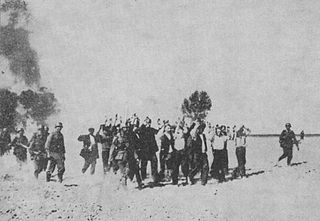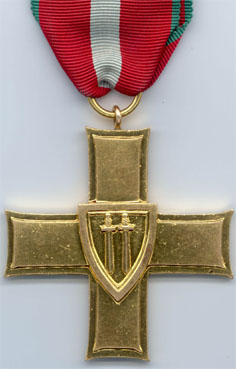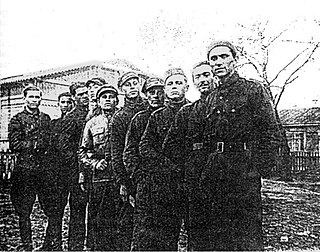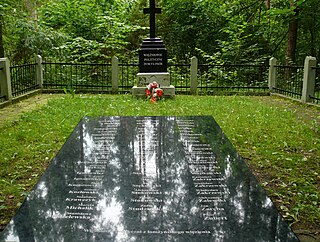External links
![]() Media related to Communist crimes (Polish legal concept) at Wikimedia Commons
Media related to Communist crimes (Polish legal concept) at Wikimedia Commons
| Authority control databases: National |
|---|
Communist crimes (Polish : zbrodnie komunistyczne) is a legal definition used in the Polish Penal Code. The concept of a communist crime is also used more broadly internationally, and is employed by human rights non-governmental organizations as well as government agencies such as the Unitas Foundation, the Institute for Information on the Crimes of Communism, the Institute for the Study of Totalitarian Regimes, the Institute for the Investigation of Communist Crimes in Romania, and the Office for the Documentation and the Investigation of the Crimes of Communism.
In legal terminology – as defined by the Article 2.1 of the Journal of Laws (Dziennik Ustaw, DzU) of the Republic of Poland issued 18 December 1998, [1] "communist crimes" constitute crimes committed by the functionaries of the communist apparatus between 17 September 1939 and 31 December 1989. The crimes defined therein form either political repression or direct violation of human rights of an individual or a group; including those, otherwise named in Polish criminal law of that particular time. The concept also covers several other illegal activities prohibited by Polish laws already in place since 1932, such as falsification of documents and using them with the intent to cause harm to people mentioned in them. [2]
The concept of communist crimes was legally introduced in 1998 and revised several times. [3] It was designed to facilitate studies of events and prosecution of people in authority who committed crimes against Polish citizens as well as the Polish state. [4] The definition is conceptually similar to the legal concept of a Nazi crime. [5]
A functionary of a communist state is defined as a public official including those who received legal protection similar to public officials, particularly government officials and leaders of the Communist Party. [1] The functionaries involved would most likely work for Polish intelligence, security service and other internal affairs (particularly censorship and religious affairs) departments. Particular organisations named as examples include Ministry of Public Security of Poland, Służba Bezpieczeństwa and Główny Zarząd Informacji Wojska Polskiego. [6] The communist crimes could have also been committed in Poland by members of foreign civil or military services, [7] such as the KGB, NKVD, SMERSH, and Stasi.
Crimes, recognised by international law as crimes against humanity, crimes against peace, and war crimes, are not affected by the statute of limitations in Poland. Those crimes are not affected either by the former amnesty or abolition decrees issued in communist Poland before 7 December 1989. [8] In case of murders, the Polish statute of limitations begins on 1 August 1990 and runs for 40 years, and for 30 years for other crimes. [9]
The concept has replaced the term Stalinist crime (zbrodnia stalinowska) previously used in Polish law for similar acts, [5] just as the concept of Nazi crime has replaced that of the Hitlerite crime. Both Stalinist and Hitlerite crimes were first defined by Polish legislation in 1991. [10]
While drafting the concept of the communist crime, Polish legislators specifically discarded the notion that a communist crime is equal to a Nazi crime, or that the legislation of the communist crime can be based on that of the Nazi crime (already defined in the legislation of 31 August 1944), as while similar on some levels they are different enough on others to make analogies unacceptable. [5]
Communist crimes are primarily investigated by the Institute of National Remembrance, a special research institute with prosecution powers, created by the same legislation that defined the concept of the communist crime in 1998. Two examples of such unsolved communist crimes are the Augustów roundup and Kąkolewnica massacre, also known as the Baran Forest massacre.
![]() Media related to Communist crimes (Polish legal concept) at Wikimedia Commons
Media related to Communist crimes (Polish legal concept) at Wikimedia Commons

The Institute of National Remembrance – Commission for the Prosecution of Crimes against the Polish Nation is a Polish state research institute in charge of education and archives which also includes two public prosecution service components exercising investigative, prosecution and lustration powers. The IPN was established by the Polish parliament by the Act on the Institute of National Remembrance of 18 December 1998 through reforming and expanding the earlier Main Commission for the Investigation of Crimes against the Polish Nation of 1991, which itself had replaced a body on Nazi crimes established in 1945.

The Narodowy Bank Polski, often abbreviated to NBP, is the central bank of Poland, founded in 1945. It controls the issuing of Poland's currency, the Polish złoty. The bank is headquartered in Warsaw, and has branches in 16 major Polish cities. The NBP represents Poland in the European System of Central Banks, an EU organization.

The pacification actions in German-occupied Poland during World War II were one of many punitive measures designed to inflict terror on the civilian population of local villages and towns with the use of military and police force. They were an integral part of the war of aggression against the Polish nation waged by Nazi Germany since September 1, 1939. The projected goal of pacification operations was to prevent and suppress the Polish resistance movement in World War II nevertheless, among the victims were children as young as 1.5 years old, women, fathers attempting to save their families, farmers rushing to rescue livestock from burning buildings, patients, victims already wounded, and hostages of many ethnicities including Poles and Jews.

The 17th Infantry Division was an infantry division of Nazi Germany, active before and during World War II. Formed in 1934, it took part in most of the campaigns of the Wehrmacht and was decimated in January 1945. Reconstituted in Germany, it surrendered to the Allies in May of that year. The division was responsible for a number of war crimes.

The Ministry of Public Security, was the secret police, intelligence and counter-espionage agency operating in the Polish People's Republic. From 1945 to 1954 it was known as the Security Office, and from 1956 to 1990 as the Security Service.

Dziennik Ustaw or Dziennik Ustaw Rzeczypospolitej Polskiej is the most important Polish publication of legal acts. It is the only official source of law for promulgation of Polish laws. The publication of this journal is solely the responsibility of the Prime Minister of the Republic of Poland. 'Dziennik Ustaw' traces its history to the 1918 'Dziennik Praw Królestwa Polskiego' and has changed its name several times during its existence.
The Polish law or legal system in Poland has been developing since the first centuries of Polish history, over 1,000 years ago. The public and private laws of Poland are codified.
The Augustów roundup was a military operation against the Polish World War II anti-communist partisans and sympathizers following the Soviet takeover of Poland. The operation was undertaken by Soviet forces with the assistance of Polish communist units, and conducted from July 10 to July 25, 1945, in Suwałki and Augustów region of northern Polish People's Republic.

The "cursed soldiers" or "indomitable soldiers" comprised a heterogeneous array of anti-Soviet-imperialist and anti-communist Polish resistance movements formed in the later stages of World War II and in its aftermath by members of the Polish Underground State. The above terms, introduced in the early 1990s, reflect the stance of many of the diehard soldiers.

The Order of the Cross of Grunwald was a military decoration created in Poland in November 1943 by the High Command of Gwardia Ludowa, a World War II Polish resistance movement organised by the Polish Workers Party. On 20 February 1944 it was confirmed by the State National Council and on 22 December by the Polish Committee of National Liberation and further confirmed on 17 February 1960 by the government of the People's Republic of Poland.

The Przyszowice massacre was a massacre perpetrated by the Red Army against civilian inhabitants of the Polish village of Przyszowice in Upper Silesia during the period January 26 to January 28, 1945. Sources vary on the number of victims, which range from 54 to over 60 – and possibly as many as 69. The Institute of National Remembrance, a Polish organization that carried out research into these events, has declared that the Przyszowice massacre was a crime against humanity.

Nazi crime or Hitlerite crime is a legal concept used in the Polish legal system, referring to an action which was carried out, inspired, or tolerated by public functionaries of Nazi Germany (1933–1945) that is also classified as a crime against humanity or other persecutions of people due to their membership in a particular national, political, social, ethnic or religious group.

The Naliboki massacre was the 8 May 1943 mass killing of 127 or 128 Poles by Soviet partisans in the small town of Naliboki in German-occupied Poland.

Decommunization in former communist states is the process of purging former communist high officials and eliminating communist symbols.

The anti-communist resistance in Poland, also referred to as the Polish anti-communist insurrection fought between 1944 and 1953, was an anti communist and anti-soviet armed struggle by the Polish Underground against the Soviet domination of Poland by the People's Republic of Poland puppet regime, since the end of World War II in Europe. The guerrilla warfare conducted by the resistance movement formed during the war, included an array of military attacks launched against communist prisons, state security offices, detention facilities for political prisoners, and prison camps set up across the country by the Stalinist authorities.

Jeziorko is a village in the administrative district of Gmina Piątnica, within Łomża County, Podlaskie Voivodeship, in north-eastern Poland. It lies approximately 6 kilometres (4 mi) north-east of Piątnica, 8 km (5 mi) north-east of Łomża, and 68 km (42 mi) west of the regional capital Białystok.
The Supreme National Tribunal was a war-crime tribunal active in communist-era Poland from 1946 to 1948. Its aims and purpose were defined by the State National Council in decrees of 22 January and 17 October 1946 and 11 April 1947. The new law was based on an earlier decree of 31 August 1944 issued by the new Soviet-imposed Polish regime, with jurisdiction over "fascist-Hitlerite criminals and traitors to the Polish nation". The Tribunal presided over seven high-profile cases involving a total of 49 individuals.
The Amendment to the Act on the Institute of National Remembrance of 2018 is a partly repealed Polish law that criminalized public speech attributing responsibility for the Holocaust to Poland or the Polish nation; the criminal provisions were removed again later that year, after international protests. Article 2a, addressing crimes against "Polish citizens" by "Ukrainian nationalists", also caused controversy. The legislation is part of the historical policy of the Law and Justice party which seeks to present a narrative of ethnic Poles exclusively as victims and heroes. The law was widely seen as an infringement on freedom of expression and on academic freedom, and as a barrier to open discussion on Polish collaborationism, leading to what has been described as "the biggest diplomatic crisis in [Poland's] recent history".
The Chief Commission for the Prosecution of Crimes against the Polish Nation is a governmental agency created in 1945 in Poland. It is tasked with investigating Nazi crimes against the Polish nation and since 1991 also of Communist crimes. In 1999, it was transformed into the main organizational unit of the investigative department of the Institute of National Remembrance (IPN).
The Act on the Institute of National Remembrance – Commission for the Prosecution of Crimes against the Polish Nation is a 1998 Polish law that created the Institute of National Remembrance. This memory law was amended twice, in 2007 and 2018.